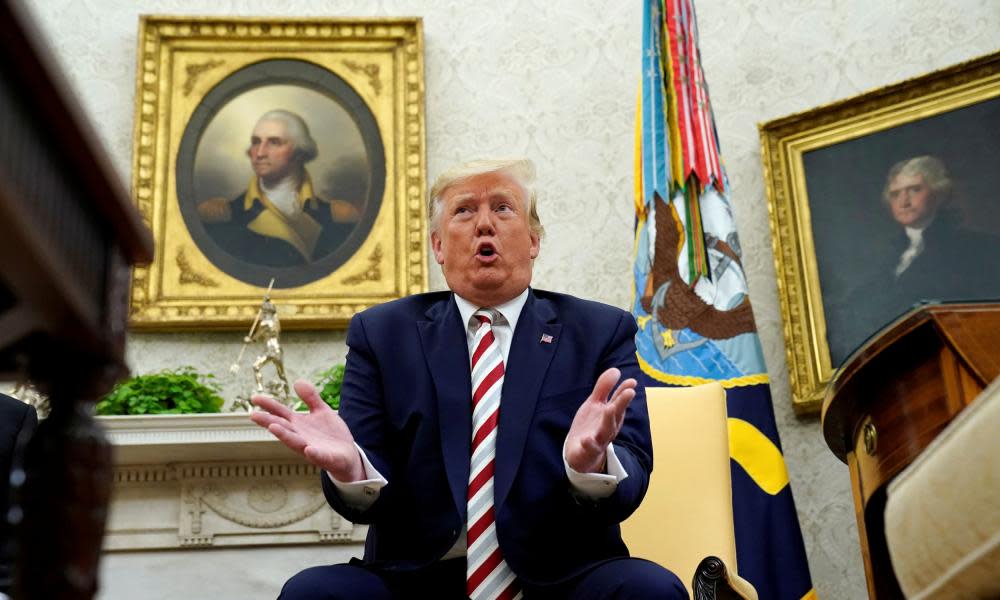How Donald Trump's ego and economic ignorance could tip Australia into recession

Australia’s economy has long been linked with that of the United States. While we are now much more dependent upon China, the increasing heated trade war between those two nations is a great danger to not only our economy growth, but also the projections for budget surpluses so desired by the Morrison government.
On 2 March last year, Donald Trump, perhaps fresh off of watching yet another 10 hours of Fox News, decided to take to Twitter to share with us his economic wisdom.
When a country (USA) is losing many billions of dollars on trade with virtually every country it does business with, trade wars are good, and easy to win. Example, when we are down $100 billion with a certain country and they get cute, don’t trade anymore-we win big. It’s easy!
— Donald J. Trump (@realDonaldTrump) March 2, 2018
It was a clear jab at China, and it presaged action six days later to raise tariffs on all steel and aluminium imports, and then in June announcing 25% tariffs on $50bn of Chinese goods, which was matched immediately by China.
Related: Trump adds a dismal dimension to the US-China trade dispute | Jeffrey Frankel
Trump in September added a 10% tariff on a further $200bn worth of Chinese goods with a potential to raise it to 25%. In May this year he announced (again via Twitter) that he intended to raise the tariff to 25% on $325bn worth of goods.
This was followed by raising a 25% tariff for $200bn and 10% on a further $300bn worth of Chinese goods. In response China has levied a 25% tariff on $110bn worth of US products.
And the impact on the US and world economy has been all bad.
Back when Trump was boasting that trade wars are good and easy to win, the US Treasury bonds market was looking very healthy.
The interest rate for one-month bonds was 1.5%, 2.06% for a one-year bond and 2.86% for a 10-year bond. The longer the US government wanted to borrow, the higher the level of interest it needed to pay.
This was a good sign that investors expected the economy to grow solidly over those years and that the US federal reserve would likely raise interest rates to stop the economy from overheating.
Now the US government can borrow for 10 years at a cheaper rate than it can for one month.
In effect investors believe bad times are ahead, and the federal reserve will need to cut rates in order to pump some life into the economy:
On Tuesday Trump suggested that “I am doing this whether it’s good or bad for your statement about, ‘Oh, will we fall into a recession for two months?’ The fact is, somebody had to take China on. Whether it’s good for our country or bad for our country, short term, it had to be done.”
He repeated that “whether it’s good or bad, short term, is irrelevant”.
Wow.
This all comes in a week in which BHP announced a 124% rise in profits to $US8.31bn for 2018-19 and in which its chief executive, Andrew Mackenzie, told journalists that “the US-China relationship is a consideration for us. We continue to enjoy strong sales to China. But no doubt this [trade standoff] will put a dampener on world economic growth. Ultimately it will impact demand for our products.”
For Australia anything that hits China’s economic growth is bad news given how important it is to our economy.
Our merchandise exports to China totalled $133.8bn in the past financial year – some $75bn more than the exports to Japan:
China now accounts for 36% of our total merchandise exports – or more than to Japan, Korea, Taiwan, the US and EU combined.
Similarly, Chinese students make up more than a third of all foreign students enrolled in higher education – and more than double the number of those from the next most common nation of India.
And while the volume of our exports accounts for around 22% of our GDP, over the past decade around 35% of the growth in our economy has come from exports.
In effect what has happened over the past 20 years is that private investment and exports have swapped in importance – during the mining boom, investment was the key; now it is exports:
It means our economic health is much more subject to conniptions in China and the US than it was prior to the GFC.
And this also has a massive impact on the budget.
BHP has recorded its huge rise in profits off the back of a surge in iron ore prices. Coal prices too have soared. This led to increased profits for all our major mining companies and a flow on increase in unexpected company tax revenue.
In the 2017-18 budget, the government estimated that in 2018-19 financial year 19.6% of total tax revenue would come from company tax, it ended up being 20.9% - $9.1bn more than predicted.
For this current financial year, the 2017-18 budget predicted company tax revenue of $91.6bn; whereas in April the budget was now predicting a further $7.3bn to $98.9bn:
That all makes for a healthy budget bottom line and allowed the government to project a budget surplus for this year of $7bn. Take away that extra company tax and the surplus is no more.
And so as the jitters across the world continue with the president of the United States now apparently trying to soften up his supporters for a recession that it needs to have, Australian companies and our government will hoping against hope that we don’t fall into a recession because of one man’s ego and economic ignorance.
• Greg Jericho writes on economics for Guardian Australia

 Yahoo News
Yahoo News 
